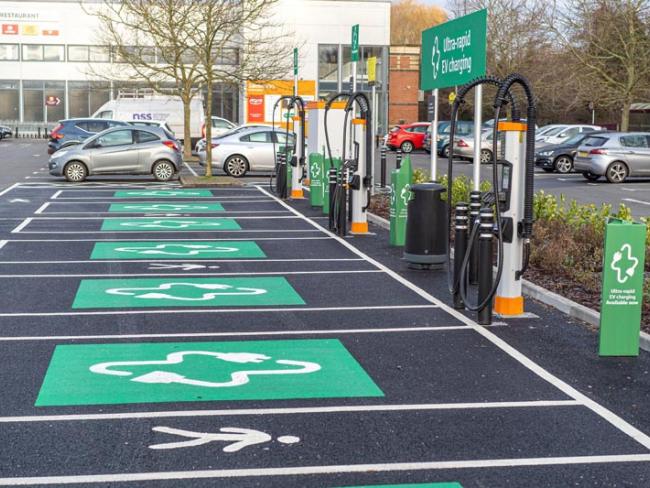
Waste of space: unused charging spaces at a Sainsbury’s in Worcester. Photo Lee Hudson/alamy.com.
After years of bluster and unrealistic charges, not to speak of soaring energy costs for consumers, influential voices are questioning the logic of the reckless obsession with the net zero dogma…
For decades, successive governments have used “combatting climate change” as a fig leaf for their relentless onslaught on British industry.
The current Labour government has, if anything, escalated the attack, with enormous wind turbines and sprawling so-called solar farms despoiling the countryside and eating up valuable agricultural land.
At the same time, Energy Secretary Ed Miliband continues to oppose new licences for oil and gas exploration in the North Sea, despite extensive reserves waiting to be tapped.
In addition, the virtual doubling of taxation rates on existing oil and gas profits has driven many former licence holders away. As with so many initiatives supposedly designed to increase government revenue, the effect has been the reverse.
Judges
And now High Court judges have nailed their colours to the net zero wagon. They have ruled in favour of an earlier decision by the North Sea Transition Authority (NSTA) to close the Gryphon floating production, storage and offloading platform, which sits over a large oil and gas field off the coast of northern Scotland.
French company Total Energies, looking to escape the punitive tax regime imposed on North Sea production, wanted to cut its losses and close the platform. The NSTA ruling was opposed by Nobel Upstream, which uses Gryphon to store output from its own fields.
The consequences of this High Court judgement are far reaching. Five oil and gas fields will be decommissioned, 200 jobs lost, the equivalent of 9 million barrels of oil reserves abandoned, and £150 million lost from Treasury revenue.
It comes just after another Grangemouth chemical plant announced that hugely uncompetitive energy prices put its survival at risk. Olefins and Polymer (O and P), the largest such plant in Britain, looks to be following in the footsteps of the Ineos oil refinery which ceased production earlier in the year. O and P produces raw materials used by hundreds of plastics companies. The impact of its loss would be on a national scale, and the effect on the Falkirk area would be devastating.
Viable
But despite Miliband’s efforts to block all North Sea production, he is not getting it all his own way. BP has announced plans to revive the Murlach field, discovered in 1986, but abandoned in 2004 as uneconomic. Now, thanks to advances in technology, it is viable again.
The Murlach field is estimated to contain recoverable reserves of 25.9 million barrels of oil and 600 million cubic meters of gas. It is expected to have a production life of 11 years. That’s 20,000 barrels of oil and 17 million cubic feet of gas per day which we wouldn’t need to import at huge cost. And how much more could be produced if these new techniques were to be deployed on other fields, previously considered spent?
Unaffordable
Many businesses were initially more than happy to toe the party line on net zero when they thought there was profit to be made -– witness the scramble to promote electric vehicles, install heat pumps in houses etc. But with unaffordable energy costs, along with a general unwillingness to put all our eggs into the net zero basket, British people remain highly sceptical.
‘Yet again we see the economics of alternative energy production unravelling…’
Ola Kallenius, head of Mercedes Benz, has warned that the car industry faces a crisis if the outright ban on new petrol and diesel cars by 2035 is not modified. Writing in the German newspaper Handelsblatt, he said, “We need to do a reality check. Otherwise we’ll drive full tilt into a wall.” BMW has also urged that the 2035 ban be delayed.
Another such reality check has prompted the Danish energy company Ørsted, the largest offshore wind developer in the world, to completely rethink its offshore wind plans. Having transitioned from oil and gas to focus on renewables, Ørsted was touted as the trailblazer in green technologies and was held up as proof that wind power was the future.
Bailout
But ever since the days of low cost lending came to an end, Ørsted’s debts began to climb. In order to prop up its balance sheet, the company is calling on Danish tax payers to bail it out to the equivalent of £7 billion. What was once a source of national pride has become a laughing stock.
Yet again we see the economics of alternative energy production unravelling. The combination of high cost borrowing, and energy costs distorted by the ever-mounting subsidies (which Miliband refuses to acknowledge) means that projects are being abandoned as businesses come to realise there is no holy grail. And if there is no prospect of a return on their investment, their green enthusiasm evaporates.
There will undoubtedly come a time when the contribution of renewables to the energy mix will keep the lights on and the machines running. Human creativity and problem solving has already seen great advances in clean air, less emitting engines, improved batteries etc. But not nearly enough to meet the demands of a modern industrial economy.
Time to face reality. If all these schemes are propped up by massive subsidies, they are unviable, they cannot stand on their own two feet. It’s high time we demanded the drive for net zero at all costs be replaced by a drive to restore our industrial foundations.
